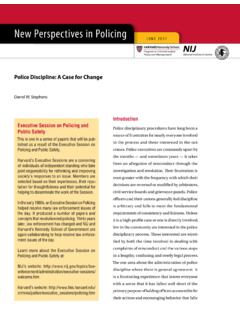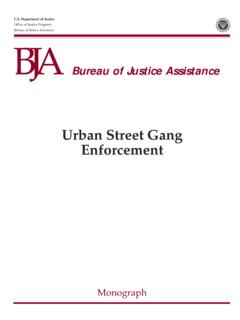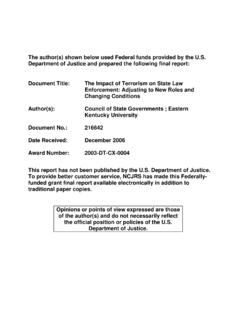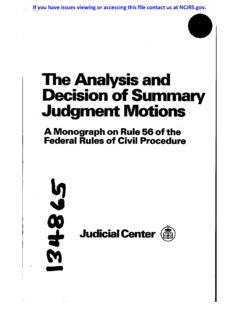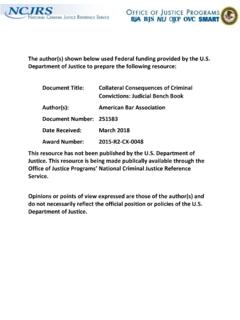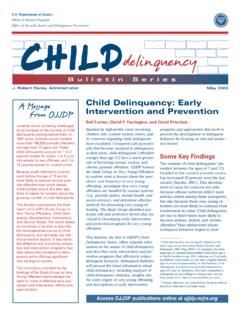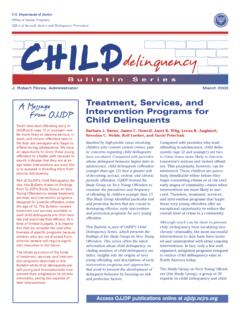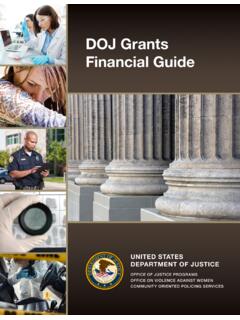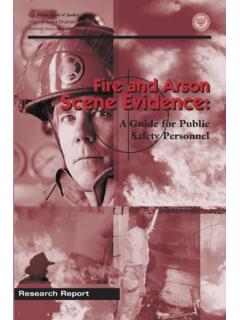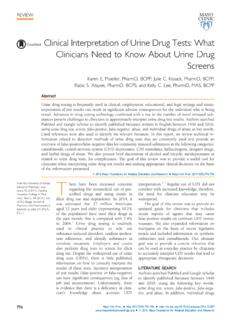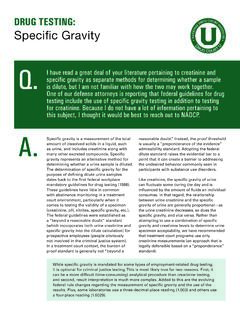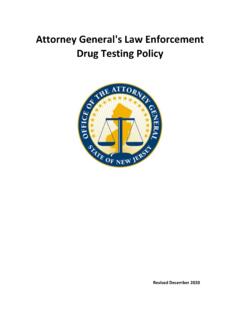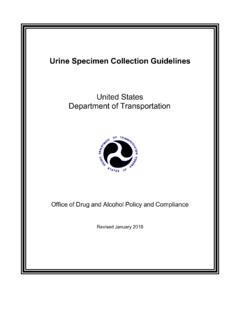Transcription of Drug Testing in a Drug Court Environment: Common Issues …
1 Department of JusticeOffice of Justice ProgramsDrug Courts Program OfficePrepared by the drug CourtClearinghouse and TechnicalAssistance ProjectDrug Courts Program OfficeDrug Testing in a drug Court Environment: drug COURTS RESOURCE SERIESCOMMON ISSUESTO ADDRESSCOMMON ISSUESTO ADDRESSC overs 1-4 6/13/00 2:13 PM Page Department of JusticeOffice of Justice Programs810 Seventh Street , DC 20531 Janet RenoAttorney GeneralDaniel MarcusActing Associate Attorney GeneralMary Lou LearyActing Assistant Attorney GeneralMarilyn McCoy RobertsDirector drug Courts Program OfficeOffice of Justice ProgramsWorld Wide Web Home Courts Program OfficeWorld Wide Web Home grant and funding information contactDepartment of Justice Response Center1 800 421 6770 NCJ 181103 This report was prepared by the Office of Justice Programs drug Court Clearinghouse and Technical Assistance Project at American University, Washington, This project is supported by grant numbers 95 DC MX K002 and 98 NU VX K018.
2 Awarded by the drug Courts Program Office, Office of Justice Programs, Department of Justice. Points of view or opinions in this document are those of the authors and do not necessarily represent the official position or policies of the Department of 1-4 6/13/00 2:13 PM Page 2 OJP drug Court Clearinghouse and Technical Assistance ProjectAmerican UniversityIssues Paper SeriesDrug Testing in a drug Court Environment: Common Issues TO ADDRESSJ erome J. Robinson, , , , , District of Columbia Pretrial Services Agency drug LaboratoryJames W. Jones, , , Director, District of Columbia Pretrial Services Agency drug LaboratoryMay 2000 Cover images 2000 PhotoDisc, Testing is a cornerstone of drug Court program operations.
3 The functioning of all drug courts relies on theintegrity and accuracy of the drug Testing process as well as the immediacy with which drug Testing services areaccessed and the reliability of results obtained. This Issues paper has been prepared by the OJP drug Court Clearinghouse and Technical Assistance Project toaddress the most frequent Issues that have been raised by drug Court programs regarding drug Testing . Although thisreport is by no means a definitive treatment of all of these Issues , it is intended to provide an overview for drug courtprogram officials primarily lay persons regarding the most critical topics that need to be addressed in developingand maintaining a drug Testing capability.
4 The authors, Jerome Robinson and James Jones, director and deputy director, respectively, of the District ofColumbia Pretrial Services Agency drug Laboratory, are forensic scientists and have worked for many years with theapplication of drug Testing technologies in a variety of sectors. The results of their experience, research, and training,as they apply to drug Testing in a drug Court environment, are synthesized in this document. We are grateful for the helpful comments and insights of the following individuals who reviewed this document indraft: John N. Marr of Las Vegas, Nevada, who directs the drug treatment component of most of the Nevada drugcourts, including the drug Testing conducted by those programs, and Dr.
5 Leo Kadehjian, of Palo Alto, California, abiomedical scientist who oversees the drug Testing program for the Federal Court system. Their advice and suggestions have been incorporated throughout the Testing is a science that requires the guidance and oversight of appropriately trained forensic scientists. Wehope that this document will assist drug Court officials in working with forensic experts in the design and operationof the drug Testing component of their drug Court S. Cooper, DirectorOJP drug Court Clearinghouse and Technical Assistance ProjectAmerican UniversityiiiForeword 1. Introduction ..1 drug Testing : A Continually Evolving Science ..12. drug Testing Methodologies ..3 Most Commonly Used Samples for Detecting drug Use.
6 3 Urine ..3 Blood .. 3 Hair ..3 Sweat ..4 Saliva ..4 Testing Technologies .. 4 Immunoassay .. 4 Chromatography .. 4 Testing Procedures ..4 Testing Methods ..4 Instrument Testing ..4 Non-Instrument Testing : Point-of-Contact Tests .. 5 Role of Breathalyzers in drug Testing Programs .. 5 Testing for Special Substances ..5 Inhalants ..5 Tobacco ..6 Considerations in Selecting the Appropriate Testing Method for Individual drug Court Programs ..63. Critical Components of a drug Court drug Testing Program ..7 Ensuring Adequate Staffing ..7 Maintaining the Integrity of the Process ..7 Detecting Adulteration ..8 Screening for Common Methods of Adulterated Specimens ..8 Waterloading.
7 8 Addition of Common Household Products ..8 Submission of Another s Specimen ..8 Use of Diuretics ..8 Checking for Temperature, Color, and Other Evidence of Tampering ..8 Additional Tips ..10 Determining Appropriate Testing Frequency ..10 Spot Testing ..10 Random Testing ..10 Using Confirmation Testing ..10 Maintaining Specimens for Retesting ..11 Obtaining Accurate and Meaningful Interpretation of Results ..11 Establishing Cutoff Levels for the drug Court Program ..11 Addressing Spiking Situations ..11 Understanding the drug Use Characteristics in the Local Jurisdiction ..12 Determining an Acceptable Error Rate for the Testing Program ..12 Development and Periodic Updating of Procedures Manual Documenting All Aspects of the drug Testing Process.
8 12vContentsDefendant Agreements To Comply With drug Testing Program Requirements and for Release of Information ..124. Tips for Promoting an Effective drug Court drug Testing Program ..13 Educate and Train Everyone Involved About the Process and Procedures ..13 Anticipate Situations That May Occur ..13 Recognize Situations That Can Create Positive Test Results That Challenge the Integrity of the Testing Process ..13 Develop Contracts With Participants That Increase Responsibility for Eliminating Situations That Challenge the Test Results ..13 Document All Policies and Procedures in Writing ..14 5. Estimating drug Testing Costs ..156. Questions To Ask drug Testing Equipment and/or Supply Vendors.
9 177. Frequently Asked Questions ..19 Appendix: drug Test Cutoff Values ..21 Notes ..22 References ..22viDRUG COURTS RESOURCE SERIESThe effective operation of a drug Court program ispremised upon having the capacity to: conduct frequent (often two to three times per week) and random drug tests of participants; obtain test results immediately; maintain a high degree of accuracy in test Testing is a key component of drug Court programsbecause it provides readily available and objective infor-mation to the judge, other justice system officials,treatment personnel, and caseworkers regarding a partic-ipant s progress in treatment. The drug Testing process,coupled with immediate program responses, forcesdefendants to address their substance abuse problemsimmediately and professional discipline requires professionallytrained individuals.
10 Forensic drug Testing is no excep-tion. drug Testing is a complex science and requires thesupport of a forensic expert regardless of the testingmethod that is used. As with any scientific test, theinterpretation of a drug test result requires balancing anumber of factors, including elements directly related tothe test, the physical characteristics of the individualbeing tested, and the nature and length of the individ-ual s drug usage. The value and usefulness of a drugtesting regime are dependent on the scientific integrityof the drug Testing process and the accurate interpreta-tion and assessment of the raw data. This is not to saythat every program must hire a pathologist or certifiedlab technician to interpret test results.
